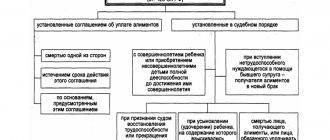Alimony for a minor is money that is intended to support the life of a child. Parents who receive money are obliged to spend it exclusively on the child, therefore, although they formally manage it, they are not the rightful owners of this money. When talking about whether alimony payments can be seized for debts during enforcement proceedings, it is necessary to remember that no, they cannot. These funds are not subject to seizure during the execution of a court decision.
To what account do payments for the maintenance of a minor go?
If a citizen’s account for transferring child support is seized, this situation cannot be ignored.
Article 60 of the Family Code of the Russian Federation indicates that the alimony funds that the parent transfers for the maintenance of the child are at the disposal of the other parent - the one with whom the child actually lives. This wording means that the money goes to the parent’s account, but the parent is assigned the obligation to spend the received amounts in the interests of the child. The same article of the Family Code of the Russian Federation establishes the possibility of transferring part of the funds, no more than 50%, to a separate account opened in the name of the minor himself. This procedure is approved by the court, and the court, in making a decision to open a separate account, is based on the interests of the child. For example, if the parent with whom the minor lives improperly fulfills his duties, spends the funds transferred by the other parent not on the child, and does not provide him with the necessary lifestyle, then, at the insistence of the payer, the court has the right to make such a decision.
Is it possible to seize alimony payments?
FSSP employees have special rights. They can apply a number of measures in relation to those debtors against whom enforcement proceedings have been opened. To open such a production, you will need justification, which is:
- Judgment.
- Performance list.
After the debt collection work has begun, the bailiff has the right to alternately apply the following measures in relation to the defaulter:
- Notify him of the obligation to repay the accumulated debt within the prescribed period.
- Apply penalties.
- Seizure of accounts, including bank cards and deposits.
- Banning travel outside the Russian Federation.
- Blocking a driver's license.
- Seizure of property.
- Sale of property assets at auction to pay off debt obligations.
Since child support payments most often go to a bank account, it can also be seized. But, according to the law, alimony payments have a specific purpose and are aimed at meeting the needs of the child, not the adult, and therefore cannot be arrested by the bailiffs.
Can this account be blocked?
The question of whether bailiffs have the right to seize alimony is clarified in Art.
101 of Federal Law No. 229-FZ of October 2, 2007, which lists the types of income that are prohibited from being seized as part of enforcement proceedings. Money for child support is included in such income. It follows from this that if the bailiffs have seized the alimony account, such a decision on their part is not legal and is subject to challenge. The prohibition on seizing money for the maintenance of a minor is based on the need to protect children. Although this money is formally at the disposal of the parent, it belongs to the child and should be spent on him. If a citizen’s child support card is seized, access to it must be returned as soon as possible - the child is not responsible for the parent’s debts.
Despite the prohibition of seizure of alimony funds, in practice this happens often. As part of enforcement proceedings, bailiffs send requests to banks about the presence or absence of the debtor's accounts. The bank in which the debtor has an account reports this fact, but does not provide information about the source of funds in this account. The money on the card is impersonal, so the bailiff seizes it, not knowing that it is intended for the debtor’s minor child.
Therefore, even if there is a clear legislative answer to the question of whether they have the right to seize alimony payments, such a practice exists.
What to do if child support is suspended?
If the bailiffs have decided to block your account along with the alimony payments located there, only specially trained people can deal with this. We recommend that you seek legal assistance. Often, the very fact that a lawyer appears in the case helps solve the problem. Bailiffs can lift the arrest of alimony payments simply in order not to have unnecessary problems.
There are two ways to appeal the bailiffs’ decision to seize your child’s child support:
- Administratively. In this case, a complaint is submitted to the head of the bailiff, who decided to seize alimony in your account. Usually a complaint is written to the head of the department. The complaint sets out the circumstances of the case and necessarily refers to the fact that the bailiff could not block alimony on the basis of clause 7 of Art. 101 of Law No. 229-FZ, and ask to cancel the illegal decision. Quite often this is enough for the bailiff who decided to arrest alimony to cancel it.
- Judicially. Using the court to overturn the FSSP's decision to seize alimony will take longer and be more expensive. However, when the bailiff service refuses to cancel an illegal decision, this method remains the only one.
You need to file a claim with the court to cancel the FSSP’s decision to arrest your child’s alimony. The statement of claim is drawn up in free form. It should contain:
- The name of the court and the defendant (FSSP), as well as the full name of the plaintiff and methods of contacting him.
- The circumstances under which the decision was made to seize alimony.
- An indication of the illegality of this decision. A reference to the legislative acts of the Russian Federation will be required.
- Requirements: cancel the decision to seize alimony and, if desired, punish the executor, force him to pay you compensation for moral damage, etc.
The following must be attached to the application to the court:
- a copy of the applicant's passport;
- a copy of the birth certificates of children whose child support is blocked;
- documents confirming the assignment of alimony;
- documents from the bank stating that the money received into the account has a designated purpose;
- a receipt for payment of 300 rubles of state duty for going to court.
Expert opinion
Mikhailov Igor Konstantinovich
Legal consultant with 10 years of experience. Specializes in the field of civil law. Has experience in document examination.
At the bottom of the statement of claim is the date of its preparation and the signature of the plaintiff. Further, everything will depend on the quality of defending your legal position during court hearings.
Not all debt obligations are repaid regularly. This may be due to various life situations.
In most cases, people simply do not consider their long-term prospects and cannot cope with the financial burdens that they take upon themselves. The borrower may lose his job due to circumstances or health reasons.
It’s good if a loved one, for example a spouse, supports him in this situation. But it happens that everything collapses at once, and there is no one close to you, and you have to deal with the problems yourself.
If there are financial problems with repaying loan funds, it may happen that the bank accounts into which salaries and other regular payments are received will be seized. And debtors often wonder whether bailiffs have the right to seize child support? And how to behave if such a measure was applied?
Why is the account and card blocked?
Cards are blocked as part of enforcement proceedings.
To protect property rights, for example, to recover a debt or compensate for damage, a citizen or organization has the right to go to court. The court decision declares the debtor’s obligation to pay the claimant a certain amount. But the court itself does not have the tools to force the debtor to pay. Enforcement of the execution of a court decision is carried out by the Bailiff Service of the Russian Federation, where the claimant has the right to apply after the court decision enters into force. Enforcement proceedings are initiated on the basis of executive documents, which are: a writ of execution, a court order or a notarial agreement on alimony.
Bailiffs accept the claimant's application and the writ of execution for execution, issue a resolution to initiate enforcement proceedings, invite the debtor to fulfill the obligation voluntarily, and if voluntary fulfillment does not occur, they collect the debt forcibly. Seizure of cards is one of the measures within the framework of such forced collection.
Thus, if the bailiffs seized a card with alimony, this means that enforcement proceedings have been initiated against the recipient, his account has been discovered and the bailiffs do not know the real source of the money in this account.
Procedure and terms of money return
So, we found out whether bailiffs can impose an arrest. They have no right to do this. But what if the money was withheld?
Many debtors find out about the arrest only when they do not receive alimony payments on time. Then they contact the bank for clarification of the issue, and receive a response about the arrest.
From this moment on, the defaulter has 10 days to appeal the actions. You can stop blocking funds upon application, but in order to return previously withheld funds you will need to add an additional clause to the application. Because this service will not be implemented automatically.
If the recipient writes a request for a refund of the withheld amount, then, according to bank calculations, it will be returned within 30 days from the date of the request.
How to unblock
We must remember that bailiffs not only block cards, but also unilaterally write off the amount of debt from them. As a result, the minor child is left without a livelihood. What to do if the bailiffs have seized alimony:
- Collect documents confirming the origin of the money on the card, including the decision to assign payments for child support, his birth certificate, a statement on the card, which shows what payments were received in what amounts.
- Provide all information about the card to the bailiff who is conducting the proceedings.
- The bailiff must, based on the available documents, issue a resolution to lift the arrest.
What to do if alimony has been arrested and the bailiffs are inactive:
- appeal the bailiff’s inaction to a higher authority in the system of execution of court decisions;
- file a complaint about the bailiff’s inaction to the prosecutor’s office or court.
If by the time you contact the bailiffs the funds have already been written off, the question arises of how to return alimony from the seized account. After receiving documents from the card owner, the bailiff not only removes restrictions from the card itself, but also contacts the bank with a request to cancel the transfer from the debtor’s account. If the bailiff fails to act, this is grounds for an administrative or judicial appeal.
Contacting the FSPP
If there is no response within 10 days, you must write the same statement to the head of the FSSP department where the bailiff who seized the benefits is employed. It is not recommended to contact the procurator directly; the request will be forwarded to the bailiff service. The text of the complaint should describe the circumstances in detail and refer to Art. 101 Federal Law “On Enforcement Proceedings”.
Additionally, the following documents must be submitted:
- copy of the passport;
- a copy of the birth certificate of the child receiving alimony;
- a bank statement confirming the targeted nature of the funds received into the account.
Documents must be transferred quickly; it is best to hand them over to the office against a receipt. It is also possible to send documents by mail, but the procedure in this case will take longer. The same package is sent to the banking organization, whose employees must be warned about the situation with illegal seizure. The benefit payer must also be informed of the situation. During the period of the proceedings, it is necessary to agree on alternative ways of receiving royalties. Funds can be transferred in cash against a receipt or by mail.










